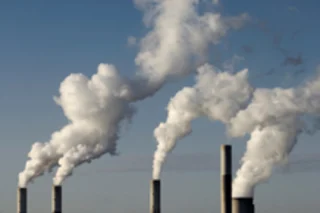This week in Nature Geoscience, a cadre of scientists going by the name Global Carbon Project will publish a meta-analysis of global carbon emissions. The study led to headlines like, "Global CO2 emissions to drop 2.8 pct in '09: report," and many others more in the ominous vein of "Earth 'heading for 6C (6 degrees Celsius)' of warming." So how did both headlines come from the same study? This year's dip is correct:
"In 2009, it is likely that the global financial crisis will cause global emissions to actually fall by a couple of percent," said Michael Raupach, co-author of the report and co-chair of the Global Carbon Project [Reuters]
. But, he says, the carbon cut will be short-lived if the recession ends. In that case, the researchers say, the world will return to its normal trend.
Since 2000 emissions have been rising by an average 3.4 per cent ...














